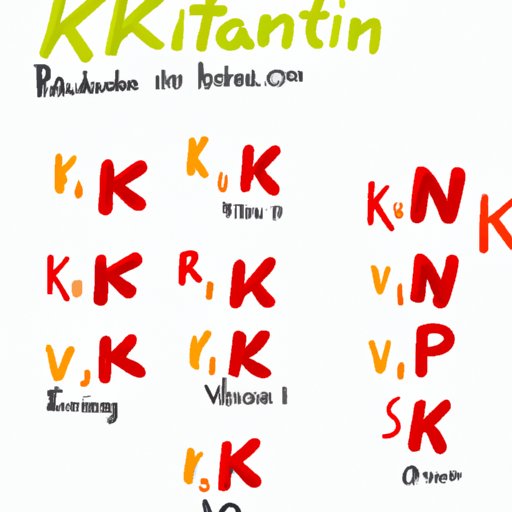
I. Introduction
Vitamin K is a fat-soluble vitamin that plays an essential role in blood clotting. However, there is confusion and misunderstanding about whether vitamin K can cause blood thinning or counteract blood thinners. Understanding the relationship between vitamin K and blood thinning is vital for those on blood-thinning medication. This article explores the truth about vitamin K and blood thinning to clear up confusion.
II. The Confusing Truth about Vitamin K and Blood Thinners: What You Need to Know
There is a lot of confusion about the role of vitamin K in blood thinning and whether it can counteract blood thinners. Vitamin K is known for its role in blood clotting and is found in many foods, including leafy greens, vegetables, and some fruits. Blood thinners, also known as anticoagulants, are medications prescribed to reduce the risk of blood clots. Some blood thinners work by blocking the function of vitamin K in the blood clotting process.
To clear up confusion, it is essential to understand the interaction between vitamin K and blood thinners to ensure that those on blood-thinning medication are taking an appropriate amount of vitamin K, neither too much nor too little, to maintain a balance.
III. Fact vs. Fiction: Separating Myths and Truths About Vitamin K and Blood Thinners
There are many myths surrounding the consumption of vitamin K while taking blood thinners. A common misconception is that individuals on blood thinning medication should avoid foods rich in vitamin K, leading to a nutritionally deficient diet. However, consuming vitamin K in a consistent and measured way is paramount to ensure that the body has enough vitamin K to produce clotting factors while maintaining the benefits of blood thinners.
A scientific study published in the Journal of Thrombosis and Haemostasis highlighted that consuming vitamin K in moderation of up to 150 µg per day by patients on anticoagulants does not lead to a negative outcome. Although vitamin K can interfere with some blood thinners, it is necessary to set a balance and a consistent intake of vitamin K to optimize both health benefits and blood-thinning medication’s effectiveness.
IV. Vitamin K: The Surprising Link with Blood Clotting and Its Effect on Blood Thinning
Understanding the role of vitamin K in blood clotting is vital to understand how it can counteract blood thinners. In healthy individuals, the liver produces clotting factors for the blood to clot when injury occurs. Vitamin K is an essential component in the production of these clotting factors, which helps produce blood clots to stop bleeding. The effectiveness of blood-thinning medication is reliant on the balance between vitamin K and the medication.
An excessive amount of vitamin K can reverse the effects of blood-thinning medication and increase the risk for blood clots, which is dangerous for individuals taking blood-thinning medication to reduce the risk of clots. While it is a crucial component in the clotting process, vitamin K has the potential to counteract the effects of blood-thinning medication.

V. Understanding the Role of Vitamin K in Blood Clotting and Its Potential to Counteract Blood Thinning
Scientific research shows that vitamin K can counteract blood thinners and increase the risk for blood clots, making it essential to monitor vitamin K intake carefully. In a study published in the Journal of the American Dietetic Association, individuals on blood-thinning medication with a consistent intake of vitamin K had a lower risk of blood clots. This is because an appropriate and consistent intake of vitamin K has proven to optimize the medication’s effectiveness while reducing the risk of clots.
It is essential to understand that the interaction between vitamin K and blood-thinning medication varies from person to person, and there is no guideline on the optimal vitamin K intake while on medication. Therefore, it is crucial to monitor vitamin K intake levels closely to maintain a balance between the medication’s effectiveness and the potential risks of blood clotting.
VI. The Importance of Monitoring Vitamin K Intake for Individuals on Blood Thinners
Tracking vitamin K consumption is essential for individuals on blood-thinning medication to maintain the appropriate balance between clotting and bleeding risks. To monitor vitamin K intake, individuals should work with a healthcare professional to create and follow a vitamin K-rich diet plan. Nutrition counseling can also help people navigate the various food options that enable individuals on blood-thinning medications to prioritize their health while still meeting their nutritional needs.
VII. Debunking Misconceptions: How Consistent Vitamin K Consumption Can Benefit Blood Thinning
There is a common misconception that consuming vitamin K while taking blood thinners can negatively impact health. This is untrue, as consistent vitamin K consumption can enhance the effectiveness of blood-thinning medication. Proper intake of vitamin K can help prevent and reduce the risk of blood clots without reversing the impact of blood-thinning medication, which is crucial for people who need to stay protected from blood clots.
Studies have shown that consistent intake of vitamin K can reduce the risk of blood clots in individuals taking blood-thinning medication. One way to maintain this consistency is consuming a variety of fruits and vegetables high in vitamin K while maintaining a balance, with consistent blood-thinning dosage being critical when taking blood thinners.
VIII. Maximizing the Health Benefits of Vitamin K Without Compromising Blood Thinning Medications
While too much vitamin K can impact blood-thinning medication’s effectiveness, consuming an appropriate and consistent amount of vitamin K has proven health benefits. Vitamin K promotes bone health, preventing osteoporosis, and reducing the risk of heart disease, among other benefits. Consuming sufficient vitamin K also reduces the risk of further blood clots developing.
Tips to maximize the health benefits of vitamin K while taking blood-thinning medication include eating a variety of vitamin K-rich foods in moderation, staying consistent with medication dosage, and working with a healthcare professional to achieve balance. Physician-monitored vitamin K supplementation can also help individuals optimize vitamin K intake and maintain their blood-thinning medication’s effectiveness.
IX. Conclusion
Understanding the interaction between vitamin K and blood thinning is crucial for individuals taking blood-thinning medication to optimize the medication’s effectiveness while reducing the risk of blood clots developing. Consuming a consistent and appropriate intake of vitamin K can enhance the medication’s effectiveness and maximize vitamin K’s health benefits. It is essential to work with a healthcare professional to monitor vitamin K intake, optimize the benefits of vitamin K, and maintain a balance that is necessary to minimize the risks associated with both inadequate and excessive consumption.




